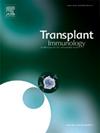“Virtual crossmatch reveals donor-specific MICA antibodies in antibody mediated rejection: First established Indian case”
IF 1.4
4区 医学
Q4 IMMUNOLOGY
引用次数: 0
Abstract
Kidney transplantation is the best treatment for patients with End-stage renal disease (ESRD), offering significant improvements in their survival and quality of life. However, immune-mediated rejection of the graft remains a critical challenge. Anti-Human Leukocyte Antigen (HLA) antibodies are well-recognized mediators of acute and chronic rejection. In contrast, the role of non-HLA antibodies particularly donor-specific Anti-MHC class I-related chain A (MICA) antibodies (dsMICA Abs) requires further investigation.
We report the first documented case in India of acute antibody-mediated rejection (AMR) in renal transplant recipients attributed to dsMICA. The patient, an 18-year-old male, developed graft dysfunction post-transplant despite a negative HLA Complement dependent Cytotoxicity crossmatch (CDCXM) and Lysate based Luminex Crossmatch (LumXm) results performed prior to transplantation. A more detailed diagnostic workup revealed the presence of dsMICA Abs, implicating them in the observed AMR. After a targeted treatment regimen of plasmapheresis and intravenous immunoglobulin (IVIG) therapy, the patient showed substantial clinical improvement, marked by declining creatinine levels and then restoration of renal function. This study underscores the clinical significance of dsMICA antibodies in AMR and advocates for the need for routine non-HLA antibody screening in addition to anti-HLA screening post-transplant immunological monitoring.
虚拟交叉配型揭示了在抗体介导的排斥反应中供体特异性MICA抗体:第一个建立的印度病例
肾移植是终末期肾病(ESRD)患者的最佳治疗方法,可显著改善患者的生存和生活质量。然而,免疫介导的移植物排斥反应仍然是一个关键的挑战。抗人白细胞抗原(HLA)抗体是公认的急性和慢性排斥反应的介质。相反,非hla抗体,特别是供体特异性抗mhc i类相关链A (MICA)抗体(dsMICA抗体)的作用需要进一步研究。我们报告了印度首例由dsMICA引起的肾移植受者急性抗体介导的排斥反应(AMR)。患者是一名18岁的男性,尽管移植前进行了HLA补体依赖性细胞毒性交叉配型(CDCXM)和基于Lysate的Luminex交叉配型(LumXm)结果为阴性,但移植后出现了移植物功能障碍。更详细的诊断检查显示dsMICA抗体的存在,暗示它们与观察到的AMR有关。经过针对性的血浆置换和静脉注射免疫球蛋白(IVIG)治疗方案后,患者临床表现明显改善,肌酐水平下降,肾功能恢复。本研究强调了dsMICA抗体在AMR中的临床意义,并倡导在移植后的免疫监测中,除抗hla筛查外,还需要常规的非hla抗体筛查。
本文章由计算机程序翻译,如有差异,请以英文原文为准。
求助全文
约1分钟内获得全文
求助全文
来源期刊

Transplant immunology
医学-免疫学
CiteScore
2.10
自引率
13.30%
发文量
198
审稿时长
48 days
期刊介绍:
Transplant Immunology will publish up-to-date information on all aspects of the broad field it encompasses. The journal will be directed at (basic) scientists, tissue typers, transplant physicians and surgeons, and research and data on all immunological aspects of organ-, tissue- and (haematopoietic) stem cell transplantation are of potential interest to the readers of Transplant Immunology. Original papers, Review articles and Hypotheses will be considered for publication and submitted manuscripts will be rapidly peer-reviewed and published. They will be judged on the basis of scientific merit, originality, timeliness and quality.
 求助内容:
求助内容: 应助结果提醒方式:
应助结果提醒方式:


